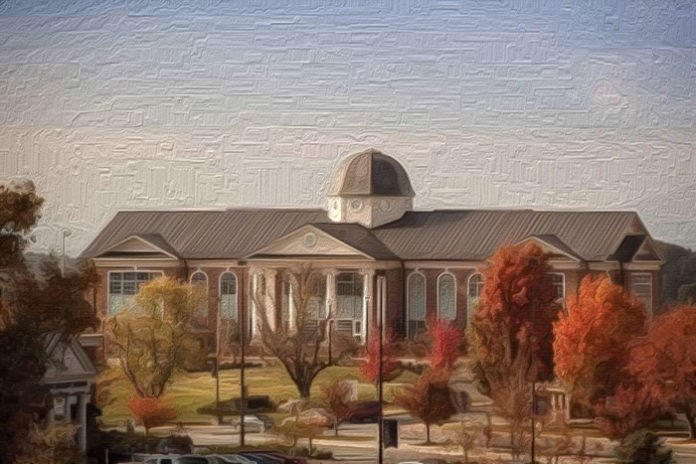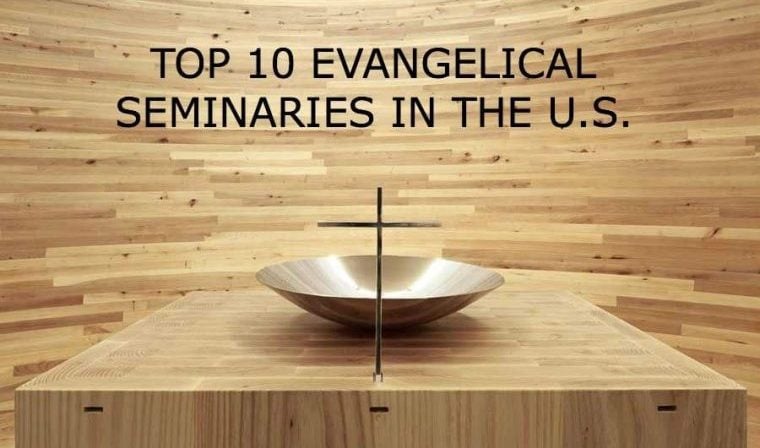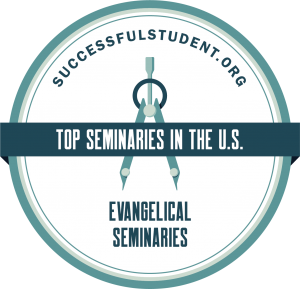This is a ranking of the Top 10 Evangelical Seminaries in the U.S.
This list is designed for students to be informed of school options for evangelical seminary education.
These institutions are usually theologically conservative. They typically hold to biblical inerrancy, or at least a very high view of inspiration, and will often take a very traditional stand on social issues.
These schools are often younger than mainline denominational schools. However, some of these schools are now the largest places of theological education on the globe.
The Master of Divinity is a popular degree for a pastorate position. This degree usually requires biblical languages (Greek and Hebrew) as well as Mission and Preaching courses.
The Master of Theology often requires less hours and is more of the academic track, possibly to start a PhD program.
If teaching at the collegiate level is your goal, the Master's degree and the relevant PhD in your subject of choice might be the ideal track. There are plenty of subjects to study and different degree types, and it's best to look at the degree offerings and decide which most appeals to you for your desired vocational goals.
Featured online colleges:
The Top 10 Evangelical Seminaries in the US
1. Dallas Theological Seminary (Dallas, Texas)
Perhaps no school has had a greater impact on recent theology than Dallas Theological Seminary. Dallas was founded with a very specific purpose in mind: to teach and systematize dispensationalist theology. Before Dallas, the school of thought that divided the Bible into seven distinct historical periods or dispensations (and argued for a sharp distinction between Israel and the church), was largely unheard of.
But after the considerable work of Scoffield's Study Bible and Lewis Sperry Chafer's eight volume systematic theology, dispensational theology began to establish itself as a credible school of thought within the Christian tradition. Now the majority of Evangelicals hold to some variation of this system. The school also set a very high bar for academic preparation by combining the curriculum for the MDiv and ThM degrees.
All DTS students graduate with an additional year's worth of classes. Dallas' substantial contribution to Evangelical Theology is why it was selected to hold the original Chicago Statements.
2. Fuller Theological Seminary (Pasadena, California)
Fuller Theological Seminary might not have the largest endowment (although its resources are impressive), nor is it the largest seminary (although it is one of the biggest seminaries in the world), but it does have one powerful advantage with which no other school can compete. Fuller appeals to a larger range of theological traditions than any other Seminary in the world.
Some schools are distinctly liberal, others high church and traditional, and still others are decidedly evangelical. But Fuller manages to retain respect from the full theological spectrum with 110 denominations and 90 countries represented in its diverse student body. The school has done this by pursuing an eclectic approach to missions. Fuller graduates are willing to change their presentation styles and practices as long as doing so does not undermine gospel truth.
This wide range in liturgy and denominations has also given the school a less explicit stand on biblical inerrancy. Thus, students who have a high regard for the Bible but are uncomfortable requiring everyone around them to do the same often see Fuller as a good middle ground between the conservatism of a typical Evangelical seminary, and the liberalism of typical mainline denominational seminaries.
3. Biola University/Talbot School of Theology (La Mirada, California)
Biola University began in 1908 as the Los Angeles Bible Institute. As the years progressed it rapidly transformed into a two year college, and under the leadership of Dr. Louis T. Talbot it become a 4 year college. Now it stands as one of America's premiere Christian universities that also runs Talbot Theological Seminary.
To this day, all students who graduate from Biola are required to study a core curriculum of Bible related courses designed to give each student an overarching background in the scriptures. Biola and Talbot have made extraordinary strides in a number of theological sub disciplines: especially the area of philosophy and apologetics.
Few realize that the largest master's program in philosophy in America is run out of Biola/Talbot. They have well over 100 students studying in their Philosophy of Religion and Ethics program, which routinely places students in top PhD programs. The school is also home to some of the Evangelical Community's most deeply respected apologists, such as William Lane Craig and J.P. Moreland.
4. Southern Baptist Theological Seminary (Louisville, Kentucky)
Southern Baptist Theological Seminary, often called Southern Seminary, is the largest seminary in the United States, one of the largest in the world, and the flagship institution in training ministers for the Southern Baptist Convention. The school is located in the heart of the south in Louisville, Kentucky, and home to roughly six thousand students.
Those familiar with Southern Baptist history know that the denomination went through a turbulent period starting in the 1970's, as debates over inerrancy and women's ordination became heated. The apex of this turmoil revolved around Southern Seminary with the appointment of the conservative movement's young spearhead Al Mohler. After his appointment 96% of the staff voluntarily left instead of continuing under Mohler's strict confessionalism. Since then, Mohler has established Southern as a bastion of conservative theology.
Professors and students alike that come out of Southern hold to extremely high views of the inerrant authority of scripture, traditional views of gender, creationist understandings of Genesis, and a high regard for church history (especially the Reformed Baptist tradition). Whether one loves or hates the drastic contrast which Southern underwent, no one can deny that the seminary is now one of the most influential in the world, and a leading voice among conservative Evangelical theology.
5. Westminster Theological Seminary (Glenside, Pennsylvania)
Westminster Seminary was born out of the modernist/fundamentalist divide that ravaged Christian denominations in the early 20th century. During this period a Princeton Seminary professor named Machen grew frustrated with the direction in which his denomination and seminary were moving.
He consequently left Princeton and the Presbyterian Church of the United States of America, to found Westminster and the Orthodox Presbyterian Church. The seminary has since carved out several areas of academic excellence. The most noteworthy in the larger academic arena is the schools contributions to biblical studies. Under Dr. Groves, various Westminster professors and graduate students codified the Leningrad Codex, producing the Westminster Leningrad Codex, which now underlies all Bible software.
Furthermore, the school produced a unique approach to counseling under professor Adams, which eventually evolved into the sister organization called the Christian Counseling & Educational Foundation (CCEF). And finally, Westminster is known for advancing a particular brand of apologetics called Pre-suppositionalism. Several prominent figures of this apologetic school, including John Frame, Greg Bahnsen, and most notably, Cornelius Van Til, all came through Westminster.
6. Gordon-Conwell Theological Seminary (Hamilton, Massachusetts)
Gordon-Conwell Theological Seminary began near the end of the 19th century when two Baptists ministers (for which the school is now named) decided to pool their resources and begin providing theological instruction. The school has since strategically positioned itself to be at the forefront of Evangelical inter-faith dialogue with various other religious perspectives.
It is a member of the Boston Theological Institute, which includes other respected schools such as Holy Cross Greek Orthodox Seminary, Hebrew College Rabbinical School, and Harvard Divinity School. It is common for professors at these schools to correspond with each other, and for students to study at each other's institutions.
Thus, anyone looking for a mature example of Evangelical Christianity's appraisals and interactions with high church, liberal, and Jewish communities should pay close attention to the work coming out of Gordon-Conwell. The school also runs a joint doctoral program with Boston University, giving doctoral students access to one of nations major research centers, while advancing their own theology.
7. Trinity Evangelical Divinity School (Deerfield, Illinois)
Trinity Evangelical Divinity School, (often called TEDS), did not officially exist before 1963. The school traces its roots back to 1897 when the Swedish Evangelical Free Church decided to start a ten-week Bible course in a Chicago church basement. Now the school is a leading seminary based out of Deerfield, Illinois. It is integrated into the Trinity International University family of schools, which includes Trinity College and Trinity Law School.
TEDS is a large seminary with over 1,200 students and a particularly vast graduate program with over 150 PhD students. The school is affiliated with many distinguished personalities such as apologists John Warwick Montgomery and Ravi Zacharias, the founder and editor of Sojourner magazine, Jim Wallis, and the leading New Testament scholar D.A. Carson.
TEDS also patterns with the Northside Chicago Theological Institute (NCTI), and the Association of Chicago Theological Schools (ACTS). This allows full-time Master's students to register for courses at any member school for Trinity's tuition charge.
8. Liberty University (Lynchburg, Virginia)

Liberty University is a substantial residential university with over 14,000 students. It is also one of the largest online schools in the world, with more than 100,000 distance learning students. The seminary is one of the oldest and most well established branches of the university, and unlike many large universities with a theological school, Liberty's theology informs its entire curriculum.
Everyone affiliated with the school is required to sign its strict doctrinal statement. When first founded, many thought that a school with such conservative values would struggle the way so many with similar perspectives have. Liberty endorses a literal hermeneutic, dispensational views of Bible prophecy, and young earth creationism.
Despite these controversial stands and the fierce opposition that they garner, Liberty has become one of the most influential places of theological instruction in the world. In addition to its standard, formal theology degree programs the school also runs the Liberty Home Bible Institute.
This online certificate program brings seminary level training to a wider audience for extremely reasonable prices, and at the same time expands the circle of Liberty's influence. This school is well positioned to expand its theological system in the coming years.
9. Moody Theological Seminary and Graduate School (Chicago, Illinois)
Dwight L. Moody was arguably the most effective evangelist of the 19th century. He is well known for having reached an estimated 100 million people in either preaching or through his various publishing exploits. He routinely preached to crowds measuring in the thousands on multiple continents, and worked hard to bring Christian literature into publication.
But few realize that Moody had a special passion for bringing Christian education to the urban poor, which is why he started multiple schools dedicated towards that end. This same fire and zeal, as well as Moody's conservative, Biblically centered theology, lives on in the Moody Theological Seminary and Graduate School.
This institution is self-consciously dispensationalist in its heritage and among the most theologically conservative and hermeneutically literal. Although traditionally based near Chicago, in 2009 Michigan Theological Seminary merged with Moody to form another campus located in Plymouth, Michigan.
The school has also opened a third campus at Spokane, Washington, which offers exclusively undergraduate curriculum. The school also runs Moody Publishers, which has become a respected name amidst the Evangelical world for both its explicitly Christian books, and its more general works.
10. Southern Evangelical Theological Seminary (Matthews, North Carolina)
Although barely a quarter century old, Southern Evangelical Theological Seminary has quickly risen to academic prominence. The school bears the theological emphasis of its founder, Norman Geisler. Geisler is famous for his massive four volume systemic theology and extensive research on building an intellectually justifiable faith.
As such, his seminary was self-consciously built from the ground-up on evidentialist and classical apologetics. The school runs two institutes, the Institute for Islamic Studies and the Institute for Scientific Apologetics. The school also utilizes its distance learning resources in order to run a dual enrollment program.
This allows high school students to earn college credit while completing their secondary education. Although some colleges, especially county colleges, utilize similar programs, this is very unique in the seminary world.
- The Complete List of Seminaries Offering Fully Online Master of Divinity Degrees
- The Four Most Affordable Southern Baptist Online Master of Divinity Programs
- Virginia Beach Theological Seminary
- The Best Reformed Theological Seminaries
- The Best Church of Christ Schools
- The Top Protestant Seminaries
- The Best Online Humanities Degrees for Careers
- The Top 10 Catholic and Eastern Orthodox Seminaries


